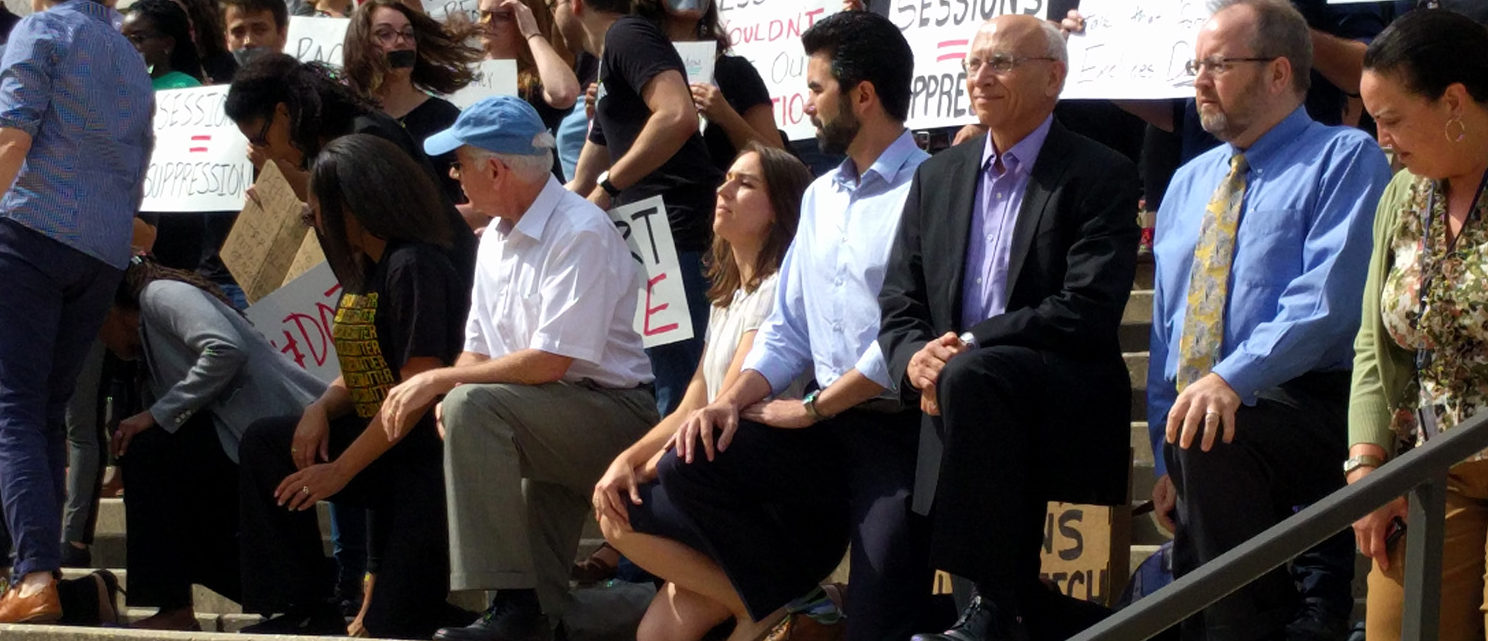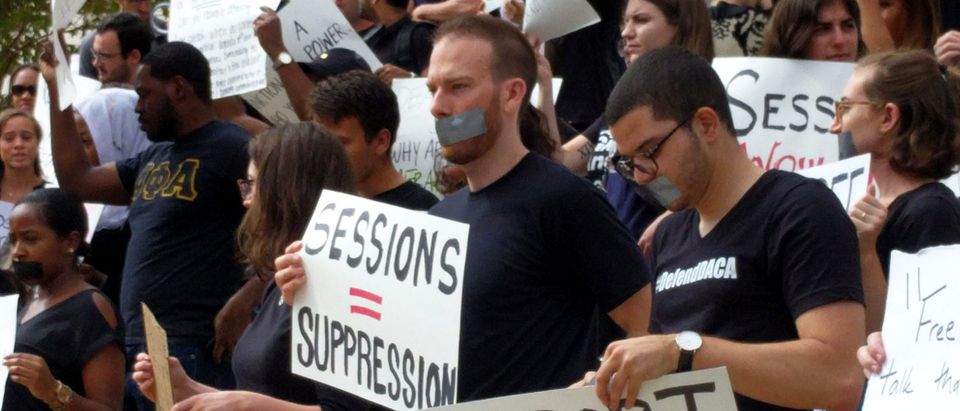Attorney General Jeff Sessions appeared before a skeptical audience of Georgetown University Law students Tuesday, warning that political correctness and “safe spaces” are threatening the tradition of free speech on American campuses.
Sessions said universities have abandoned their duty to promote free expression and inquiry and replaced it with a zealous enforcement of ideological conformity.
“The American university was once the center of academic freedom—a place of robust debate, a forum for the competition of ideas,” Sessions said. “But it is transforming into an echo chamber of political correctness and homogenous thought, a shelter for fragile egos.”
Sessions recounted a litany of recent examples where campus speakers have been shouted down or altogether prevented from appearing on campus by students who disagreed with them. Events at Middlebury College, University of California-Berkeley, and other campuses show that “freedom of thought and speech on the American campus are under attack,” Sessions said.
As evidence of that conclusion, Sessions pointed to an example from a community college in Battle Creek, Mich., where school officials had students arrested when they refused to stop handing out copies of the U.S. Constitution on campus.
The attorney general laid the blame for free speech restrictions not on students, but rather on college faculty and administrators who permit the suppression of free speech rights.
“College administrators also have silenced speech by permitting the heckler’s veto to control who gets to speak and what messages are conveyed. In these instances, administrators discourage or prohibit speech if there is even a threat that it will be met with protest,” Sessions said. “In other words, the school favors the heckler’s disruptive tactics over the speaker’s First Amendment rights.”
Giving into mob demands to shut down campus events has had the effect of “coddling” students, Sessions said. He pointed to Berkeley, which offered counseling sessions for students upset by the appearance on campus of Ben Shapiro, a conservative journalist and pundit widely regarded to be in the mainstream of right-wing thought.
Sessions’ arrival on the Georgetown Law campus was met with protest by about 200 students and Black Lives Matter activists, who took the opportunity to denounce the attorney general on a range of policies, from immigration enforcement to the administration’s travel ban.
Many of the demonstrating students were upset that they weren’t allowed to attend the invitation-only event, accusing Georgetown of hypocrisy for hosting an event on free speech while excluding voices that disagreed with Sessions.

Georgetown faculty members kneel in protest of a speech by Attorney General Jeff Sessions at the Georgetown University Law School on Sept. 26, 2017. (Will Racke/TheDCNF)
Georgetown Law professor Randy Barnett, one of the event’s organizers, told reporters that closed invitation events were commonplace at the university. He said the invitation process ensured that a diverse group of students was represented, noting that several of the students in attendance sported Black Lives Matter t-shirts.
Acknowledging the opposition to his visit, Sessions unequivocally defended the right of students and all Americans to protest the administration’s policies. That right extends to NFL players who kneel for the national anthem, Sessions said, but does not offer them protection from criticism, even by the president.
“The president has free speech rights, too,” Sessions said, referring to Trump’s Twitter broadsides against NFL teams and players. The attorney general suggested the players could win over more people to their argument if they protested in a different way.
“There are many ways these players, with all the assets they have, can express their political views … without denigrating the nation.”
Sessions’ defense of campus speech rights was not just rhetorical. He told students that the Department of Justice would take legal action to ensure that colleges uphold First Amendment protections.
As Sessions spoke at Georgetown Law, DOJ lawyers announced they had filed a statement of interest in the case of Uzuegbunam v. Preczewski, a lawsuit filed by students at Georgia Gwinnett College challenging a school policy that restricted student political expression to two small “free-speech zones.”
“There are those who will say that certain speech isn’t deserving of protection. They will say that some speech is hurtful — even hateful,” Sessions said, referring to ongoing debates about what ideas should be tolerated on campus. “They will point to the very speech and beliefs that we abhor as Americans. But the right of free speech does not exist only to protect the ideas upon which most agree at a given moment in time.”
Addressing criticism of the Trump administration’s response to white supremacist violence in Charlottesville, Sessions said protecting free expression does not mean condoning hateful or violent rhetoric.
Still, Sessions said, a free society depends on the protection of speech “precisely when it is most difficult to do so.”
Send tips to will@dailycallernewsfoundation.org.
All content created by the Daily Caller News Foundation, an independent and nonpartisan newswire service, is available without charge to any legitimate news publisher that can provide a large audience. All republished articles must include our logo, our reporter’s byline and their DCNF affiliation. For any questions about our guidelines or partnering with us, please contact licensing@dailycallernewsfoundation.org.


